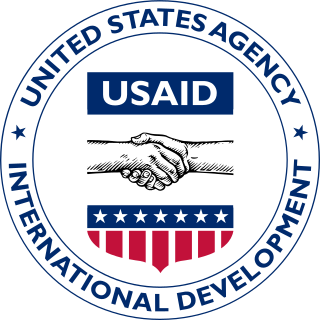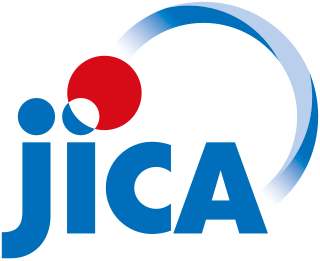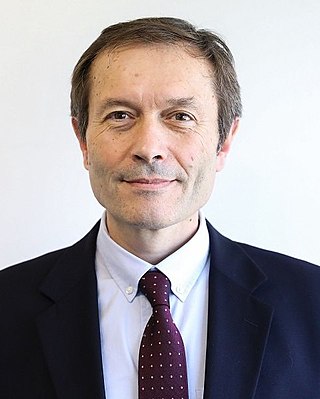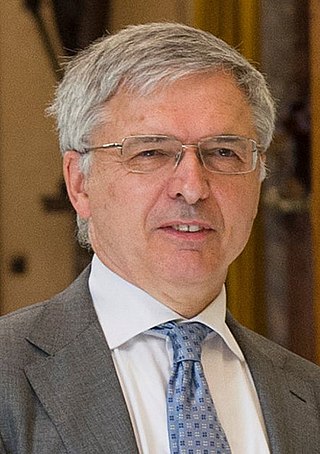Related Research Articles
The International Bank for Reconstruction and Development (IBRD) is an international financial institution, established in 1944 and headquartered in Washington, D.C., United States, it is the lending arm of World Bank Group. The IBRD offers loans to middle-income developing countries.It is the first of five member institutions that compose the World Bank Group. The initial mission of the IBRD in 1944, was to finance the reconstruction of European nations devastated by World War II. The IBRD and its concessional lending arm, the International Development Association (IDA), are collectively known as the World Bank as they share the same leadership and staff.

The United States Agency for International Development (USAID) is an independent agency of the U.S. federal government that is primarily responsible for administering civilian foreign aid and development assistance. With a budget of over $27 billion, USAID is one of the largest official aid agencies in the world and accounts for more than half of all U.S. foreign assistance—the highest in the world in absolute dollar terms.
The United States federal executive departments are the principal units of the executive branch of the federal government of the United States. They are analogous to ministries common in parliamentary or semi-presidential systems but they are led by a head of government who is also the head of state. The executive departments are the administrative arms of the president of the United States. There are currently 15 executive departments.

The Inter-American Development Bank is an international financial institution headquartered in Washington, D.C., United States of America, and serving as the largest source of development financing for Latin America and the Caribbean. Established in 1959, the IDB supports Latin American and Caribbean economic development, social development and regional integration by lending to governments and government agencies, including State corporations.

Enrique Valentín Iglesias García is an economist of Uruguayan-Spanish dual citizenship. He was once president of the Inter-American Development Bank, an international institution dedicated to furthering economic development in the Western Hemisphere through investment and policy formulation. He was appointed as Special Adviser for Venezuela to Federica Mogherini, the European Union's High Representative for Foreign Affairs and Security Policy and Vice-President of the European Commission, on 28 May 2019.

The Government of Pakistan constitutionally known as the Federal Government, commonly known as the Centre is the national government of the Islamic Republic of Pakistan, a federal parliamentary democratic republic consisting of four provinces, two autonomous territories, and one federal territory. Under the Constitution, there are three primary branches of a government: the legislative, whose powers are vested in a bicameral Parliament; the executive, consisting of the President, aided by the Cabinet which is headed by the Prime Minister; and the judiciary, with the Supreme Court.

Luis Alberto Moreno Mejía is a Colombian businessman and former diplomat who served as president of the Inter-American Development Bank (IADB) from 2005 to 2020. He was Colombia's Ambassador to the United States under president Andrés Pastrana Arango and the former President of the Instituto de Fomento Industrial.

The Japan International Cooperation Agency is a governmental agency that delivers the bulk of Official Development Assistance (ODA) for the government of Japan. It is chartered with assisting economic and social growth in developing countries, and the promotion of international cooperation. The OECD's Development Assistance Committee published a peer review of Japan's development co-operation in October 2020. It was led by Dr. Shinichi Kitaoka, the former President of the International University of Japan, from 2015 to 2022. On 1 April 2022, Professor Akihiko Tanaka assumed the presidency of the Japan International Cooperation Agency (JICA) as the successor to Professor Shinichi Kitaoka.
The Philippines' Presidential Management Staff is an agency attached to Malacañang that is tasked to manage the development and formulation of the projects and policies of the Office of the President. Though the PMS is headed by a Secretary, the Secretaries of the Cabinet, Chief of Staff, and Appointments, support the agency. The PMS, the Office of the Appointments Secretary and the newly created Events Management Cluster are under the supervision of the Office of the Special Assistant to the President.
An international financial institution (IFI) is a financial institution that has been established by more than one country, and hence is subject to international law. Its owners or shareholders are generally national governments, although other international institutions and other organizations occasionally figure as shareholders. The most prominent IFIs are creations of multiple nations, although some bilateral financial institutions exist and are technically IFIs. The best known IFIs were established after World War II to assist in the reconstruction of Europe and provide mechanisms for international cooperation in managing the global financial system.
Drinking water and sanitation in Nicaragua are provided by a national public utility in urban areas and water committees in rural areas. Despite relatively high levels of investment, access to drinking water in urban areas has barely kept up with population growth, access to urban sanitation has actually declined and service quality remains poor. However, a substantial increase in access to water supply and sanitation has been reached in rural areas.
Water supply and sanitation in Venezuela is currently limited and many poor people remain without access to piped water. Service quality for those with access is mixed, with water often being supplied only on an intermittent basis and most wastewater not being treated. Non-revenue water is estimated to be high at 62%, compared to the regional average of 40%. The sector remains centralized despite a decentralization process initiated in the 1990s that has now been stalled. Within the executive, sector policies are determined by the Ministry of Environment. The national water company HIDROVEN serves about 80% of the population.
Francisco Mayorga is a Nicaraguan economist and writer who specializes in international finance and economic development. For twenty years he taught managerial economics and corporate finance at INCAE, the leading Latin American graduate business school. In the eighties he served for five years in the board of directors of the Central American Bank (CABEI), the largest financial institution of the region. In the eighties, Mayorga also worked for the cause of peace in Central America, acting as Executive Secretary of the International Commission for Central American Recovery and Development.
Mauricio Claver-Carone is an American lawyer, former Treasury Department and National Security Council official, and lobbyist, who was the president of the Inter-American Development Bank from October 2020 until 26 of September 2022.

Carlos M. Jarque Uribe is a Mexican economist, currently Executive Director of América Móvil and Board Member of the Leading Global Group in Citizen Services FCC. He has had a distinguished career in the private sector, in public service and in the academic world.
Otaviano Canuto dos Santos Filho is a Brazilian economist. He is the executive director at the executive board of directors of the World Bank Group and its affiliates, the same position he held from 2004 to 2007. He previously served as executive director at the Board of the International Monetary Fund (IMF) for Brazil, Cabo Verde, Dominican Republic, Ecuador, Guyana, Haiti, Nicaragua, Panama, Suriname, Timor Leste and Trinidad and Tobago, as vice-president and Head of the Poverty Reduction and Economic Management (PREM) and as Senior Adviser on BRICS Economies at The World Bank, and as the State Secretary for International Affairs at the Ministry of Finance of Brazil.

Rogelio Frigerio is an Argentine economist and politician. He was Minister of Interior, Public Works and Housing during Mauricio Macri's administration. Since 2021 legislative election, Frigerio has been a National Deputy elected in the Juntos por el Cambio list in Entre Ríos.

Mario Marcel Cullell is a Chilean economist who has been serving as Chile Minister of Finance since 11 March 2022. He previously served as Governor of the Central Bank of Chile. He was named Governor in December 2016 and member of the Bank's Board from October 2015. He has been a close collaborator to the governments of the centre-left Coalition of Parties for Democracy (1990–2010), and for six years held the position of Budget Director, where he played a key role in the design of the structural surplus rule.

Gustavo Beliz is an Argentine politician and expert in global governance.

Daniele Franco is an Italian economist, central banker and civil servant who served as Minister of Economy and Finance in the cabinet of Prime Minister Mario Draghi from 2021 to 2022. From 2020 until 2021, he served as director-general of the Bank of Italy.
References
- 1 2 "Center of Government Project". Inter-American Development Bank. Archived from the original on 2014-03-13. Retrieved 2014-03-12.
- ↑ James, S.; Ben-Gera, M. (2004). A Comparative Analysis of Government Offices in OECD Countries (PDF) (Report). París:publisher=Organisation for Economic Co-operation and Development.
- 1 2 Dunleavy, P.; Rhodes, R.A. (1990). "Core Executive Studies in Britain". Public Administration. 68: 3–28. doi:10.1111/j.1467-9299.1990.tb00744.x.
- 1 2 Alessandro, M.; Lafuente, M.; Santiso, C. (2013). The Role of the Center of Government: A Literature Review (Report). Washington, D.C.: Inter-American Development Bank.
- 1 2 3 Alessandro, M.; Lafuente, M.; Santiso, C. (2013). Strengthening the Center of Government in Latin America and the Caribbean (Report). Washington, D.C.: Inter-American Development Bank. Technical Note Nro. IDB-TN-591.
- ↑ House of Commons Library (2005). The Centre of Government - No. 10, the Cabinet Office and HM Treasury (PDF) (Report). London: House of Commons of the United Kingdom. Research Paper 05/92.
- ↑ Relyea, H. (2008). The Executive Office of the President: an Historical Overview (PDF) (Report). Washington, DC: Congressional Research Service.
- ↑ Clarke, M.; Stewart, J. (1997). Handling the Wicked Issues: A Challenge for Government (Report). Birmingham: University of Birmingham. INLOGOV Discussion Paper.
- ↑ Dahlström, C.; Peters, G.; Pierre, J. (2011). Steering from the Centre. Strengthening Political Control in Western Democracies. Toronto: University of Toronto Press.
- ↑ "Network of Senior Officials from Centers of Government".
- ↑ World Bank (2010). GET Note: Center of Government Delivery Units (PDF) (Report). Washington, DC: World Bank.
- ↑ McCourt, W. (2012). "Can Top-Down and Bottom-Up be Reconciled? Electoral Competition and Service Delivery in Malaysia". World Development. 40 (11): 2329–2341. doi:10.1016/j.worlddev.2012.03.023.
- ↑ Dumas, V.; Lafuente, M.; Parrado, S. (2013). Strengthening the Center of Government for Results in Chile: The Experience of the Ministry of the Presidency and its President's Delivery Unit (2010-13) (Report). Washington, D.C.: Inter-American Development Bank. Technical Note Nro. IDB-TN-563.
- ↑ Presidencia de la República de Paraguay. Decreto 1214/2014 (Report). Archived from the original on 2014-03-12. Retrieved 2014-03-12.
- ↑ Alter, Rolf. The Centre of Government: a strategic governance response to economic and social challenges? (PDF). International Seminar Center of Government and Governability, IDB-UC, Santiago. Archived from the original (PDF) on 2014-03-12.
- ↑ Truswell, E.; Atkinson, D. (2011). Supporting Heads of Government. A Comparison across Six Countries (PDF) (Report). London: Institute for Government.
- ↑ Haddad, C.; Klouche, M.; Heneine, Y. (2010). Center of Government. The Engine of Modern Public Institutions (Report). New York, NY: Strategy& (formerly Booz & Company).